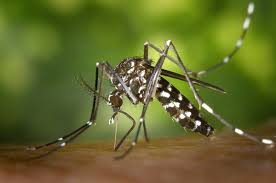Aedes Albopictus Mosquito : Study

Warmer conditions are helping the Aedes albopictus mosquito, which transmits dengue, chikungunya and Zika viruses thrive, said the EU health agency.
- Climate change is expected to significantly impact the spread of dengue in Europe.
- Rising temperatures and increased rainfall create more favorable conditions for the spread of the disease, particularly in areas where the Aedes albopictus mosquito is present.
- In southern Europe, particularly in Spain, Italy, and France, the risk of dengue is expected to increase due to the presence of Aedes albopictus and the rising temperatures and humidity.
- However, in some countries like Spain and Portugal, the expected rise in summer droughts may decrease habitat suitability for Aedes albopictus.
Aedes albopictus mosquito:
- The Aedes albopictus mosquito, commonly known as the Asian tiger mosquito, is a highly invasive species known for its distinctive black and white striped appearance.
- This mosquito is a known vector for several diseases, including: Dengue fever, Chikungunya, Zika virus, Yellow fever.




